Opening Remarks
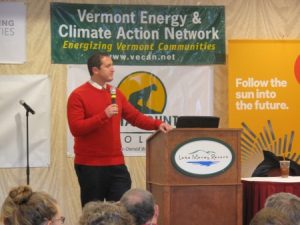 Darren Springer, Governor Shumlin’s Chief of Staff, former Public Service Department Deputy Commissioner and Senator Bernie Sanders’ former Energy and Environment Advisor.
Darren Springer, Governor Shumlin’s Chief of Staff, former Public Service Department Deputy Commissioner and Senator Bernie Sanders’ former Energy and Environment Advisor.
 Darren Springer, Governor Shumlin’s Chief of Staff, former Public Service Department Deputy Commissioner and Senator Bernie Sanders’ former Energy and Environment Advisor.
Darren Springer, Governor Shumlin’s Chief of Staff, former Public Service Department Deputy Commissioner and Senator Bernie Sanders’ former Energy and Environment Advisor.
A1 The Next Generation of Solar The solar pendulum has swung, and new rules and realities that will effect the pace, siting, scale and accessibility of solar come into effect on January 1, 2017. This workshop outlines the solar landscape in Vermont, providing an overview of the state’s new net metering program and more. Hear from experts working on-the-ground and in policy and project arenas about the role solar will likely play moving forward in helping to meet the state’s energy needs — and clean energy goals.
Anne Margolis, Vermont Public Service Department
Olivia Campbell-Andersen, Renewable Energy Vermont
Leigh Seddon, Energy Action Network
Next Generation Solar Audio Recording
A2 The Legislative Landscape and Look Forward State policy has and will play a powerful role in how or if Vermont meets its necessarily ambitious clean energy and climate goals. This workshop will look back at recent policy changes and programs — from net metering to the Renewable Energy Standard implementation. It will also provide an overview of likely energy and climate-focused initiatives in the 2017 legislative session. How to open the clean energy transition to low income earners? What are the opportunities for modern wood heat? What is the possibility of putting a price on carbon pollution in Vermont? The conversation will also highlight how local leaders can help shape this important policy-making arena.
Senator Christopher Bray, Addison County
Senator Virginia “Ginny” Lyons, Chittenden County
Lauren Hierl, Vermont Conservation Voters
Johanna Miller, Vermont Natural Resources Council
Legislative Landscape Audio Recording
A3 Moving Toward Zero Energy for Municipal Buildings Vermont municipalities and schools are taking creative approaches to reducing their carbon footprint and reducing energy costs. Come learn about innovative, as well as tried and true efforts, including establishing a revolving efficiency loan fund and cataloguing municipal energy use (Montpelier), developing a capital energy improvement plan and comprehensive improvements on the Town hall, (Hartford), undertaking comprehensive weatherization improvements on the community/municipal building (Marshfield), and moving toward modern wood heating (Windham schools).
Kate Stephenson, Montpelier Energy Advisory Committee
Maura Adams, Northern Forest Center
Martha McDaniels, Hartford Energy Commission
Rich Phillips, Marshfield Energy Committee
A4 Effectively Engaging Schools on Energy Initiatives Youth are one of our most important audiences and assets as we transform Vermont’s energy systems. Working with schools can be an effective and rewarding way of engaging the community and accomplishing meaningful projects when done right, but this work brings its own challenges. Hear from teachers and energy committee members who have been involved in projects that made a difference in their schools and communities and learn about how to authentically collaborate with schools to accomplish mutually beneficial projects.
Cara Robechek, Vermont Energy Education Program
Anne Watson, Montpelier High School/Montpelier City Council
Sarah Popowicz, Thatcher Brook Middle School
A5 Making a Clean Energy Transition Accessible for Low Income Earners Low income earners spend a far greater percentage of their take-home incomes on heating, electricity and transportation costs. Helping better serve low-income earners and communities is really important for a just energy transition. Learn about the energy-related challenges our low income neighbors face and the programs that exist to help them. Hear about successful programs and approaches that are making a difference. And brainstorm strategies to support our friends and neighbors make their energy options more affordable and renewable.
Anita Kelman,Capstone Community Action
Nate Hausman,Clean Energy States Alliance
Making the Energy Transition Accessible for Low Income Earners Audio Recording
A6 Moving Toward a Low Carbon Transportation System: Promising Developments Tackling the transportation problem may feel daunting, yet a growing number of Vermonters are making real strides in their communities; using tried-and true approaches as well advancing new strategies to achieve results. Learn how volunteer-driven efforts are inspiring a four-town initiative in Addison County to better understand travel behaviors and changes that can occur through social networking and more. This workshop will also highlight initiatives, strategies and resources to reverse the trends in transportation-based fossil fuel consumption as well as emerging policies and resources to help you make a difference at the local and regional levels.
Fran Putnam, Weybridge Energy Committee
Jennifer Wallace-Brodeur, Vermont Energy Investment Corporation
Deb Sachs, Go! Vermont
A7 The Community Energy Dashboard: An Interactive, Online Tool to Reach 90 by 2050 Want to understand what it will take for your town to reach 90 by 2050? Need to track progress locally across all energy sectors — efficiency, electricity, heat and transportation? Want to mobilize people to take more energy actions? The recently launched Community Energy Dashboard is designed to help your community shape its energy future with a powerful suite of free and interactive tools to set goals, track progress, identify and advance comprehensive energy solutions, map actions, share stories, and hear from trusted neighbors. This workshop will demonstrate how you and your community can get the most out of this innovative new tool.
Linda McGinnis, Energy Action Network
B1 The Latest in Zero Energy Homes Come explore the concept of transforming existing Vermont homes to net zero energy. Can the combination of deep efficiency improvements in the thermal envelope, improvements to the heating system, and renewable energy really move our existing housing stock toward net zero energy? Learn about the results of the Zero Energy Now program — a statewide effort to move existing homes toward net zero, as well as the Mobile Home Replacement program in which inefficient modular homes are replaced with zero energy modular units.
Malcom Gray, Building Performance Professional Association of Vermont
Peter Schneider, Efficiency Vermont
Homeowner, participant in Net Zero Now program
B2 Act 174’s New Enhanced Energy Planning Framework: What It Means for Communities There is a new framework — Act 174 — that is designed to empower communities and regions to undertake comprehensive energy planning and better influence how energy generation is sited. Learn all about this new energy planning initiative and how communities can participate, articulating how they will partner with the state to meet our collective heating, transportation, electric and energy efficiency needs. Learn how regions, which are required to develop enhanced energy plans, are approaching this process. And find out how you can work with your community to ensure the success of this effort — and help shape plans that support Vermont’s 90 by 2050 renewable energy goal in ways that balance many of your community’s values and goals.
Jim Sullivan, Bennington County Regional Commission
Anne Margolis, Vermont Public Service Department
Kate McCarthy, Vermont Natural Resources Council
B3 A Powerful, People-Centered Price on Pollution: How, What, and Why Combined, Vermont’s current policies and programs will fall far short of what it will take for the state to meet its clean energy and climate change goals. Pricing carbon pollution remains the most effective way to reduce greenhouse gas emissions and, if structured right, help all people benefit from a clean energy transition. There is a serious effort underway to advance a policy that will grow jobs, reduce Vermonters energy burdens and do our part to combat climate change. In this session, learn how policy makers and business leaders are looking for ways to pair a price on pollution with broader tax reform and investments that turn the climate crisis into economic opportunity for all.
Chris Pearson, Senator Elect from Burlington
Tom Hughes, Energy Independent Vermont Coalition
Dan Barlow, Vermont Businesses for Social Responsibility
B4 Creating Vermont’s Future Energy System: Vision, Policy and Practice The State of Vermont and utilities are increasingly readying for the inevitable shift from baseload power to more clean, distributed resources. This workshop will outline the project and energy portfolio implications of Vermont’s new “Renewable Energy Standard” taking effect in January 2017, including the “energy transformation” tier aimed at reducing Vermonters fossil fuel use. It will highlight what utilities and policy makers are doing to transform Vermont’s grid to support a more distributed, clean energy system, what more might be needed, the innovation underway in the small town of Panton and why it all matters — cost and carbon wise.
Josh Castonguay, Green Mountain Power
Dr. Asa Hopkins, Vermont Public Service Department
Paul Markowitz, Efficiency Vermont
B5 Building Power at the Local Level: Stories, Strategies, Success Stories Getting things done can be hard. How do we build credibility? What do we do about select board resistance? How do we avoid preaching to the same old choir? What community partners are we forgetting to engage? In this session, learn from volunteer teams who have won over resistant town leaders, formed unusual partnerships and built power at the local level to get things done. Join us for inspiration and a hearty discussion about what might be holding you or your energy committee back — and how to elevate your influence and impact.
Sarah Brock, Vital Communities
Alan Johnson, Hartford Selectboard and Energy Commission
Leigh Cameron, New England Grassroots Environment Fund
Building Power Audio Recording
B6 Getting to Net Zero Communities: Vermont and Samso Two Vermont cities — Montpelier and Burlington — have drawn a line in the sand and are gaining broad public support for their work to advance zero net energy. Learn how the Sustainable Montpelier 2030 Design Competition is exciting residents and non-residents alike in crafting a real vision for a carbon-free future. Hear about the Burlington Electric Department’s new zero net energy strategy and its 10-year vision for Vermont’s largest city. And, learn about the success of a small Danish island in becoming 100% renewably powered — and how Samso, Denmark’s strategies might be translated to Vermont in our state’s work for sustainable model cities.
Soren Hermansen, Samso Energy Academy (Denmark)
Jen Greene, Burlington Electric Department
B7 From the Ground Up: Sequestering Carbon in Farmland and Forests This workshop will explore the multiple benefits of the rapidly growing field of regenerative agriculture, which aims to increase soil health through techniques such as compost application and planned grazing. These techniques enable soils to capture and store much more carbon from the atmosphere than conventional soils — a potential solution to the climate crisis — as well as making them more drought-resistant and increasing their fertility. The workshop will showcase examples of regenerative agriculture on Vermont farms, review the role that Vermont’s forests play in sequestering carbon, and offer practical steps that citizens and energy committees can take to help preserve forests and farmland.
Didi Pershouse, Soil Carbon Coalition
Jesse McDougall, Studio Hill Farm
Individual Energy Leadership — Paul Cameron . 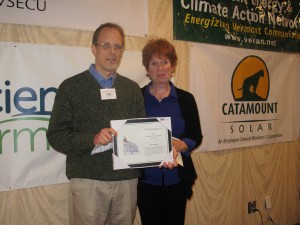 In 2003 Paul Cameron founded the nonprofit Brattleboro Climate Protection and has worked tirelessly to reduce reliance on fossil fuels ever since – locally, regionally and across Vermont. Paul helped lead a project that undertook energy efficiency upgrades in 14 municipal buildings as well as Brattleboro’s conversion to LED streetlights. These, and other energy saving projects, have significantly reduced carbon emissions and saved taxpayers over $100,000 a year. Paul was on the Board of the Brattleboro Thermal Utility and was active on the Windham Energy Group. For nine years, Paul served as Brattleboro’s Town Energy Coordinator, and in that role staffed the Brattleboro Energy Committee. “Paul quietly, efficiently and selflessly walked the walk of addressing climate change, both personally and professionally. He is an outstanding example for others to emulate,” said Brattleboro Energy Committee Chair Michael Bosworth. Paul recently moved to North Carolina to be closer to family. You will be greatly missed, Paul!
In 2003 Paul Cameron founded the nonprofit Brattleboro Climate Protection and has worked tirelessly to reduce reliance on fossil fuels ever since – locally, regionally and across Vermont. Paul helped lead a project that undertook energy efficiency upgrades in 14 municipal buildings as well as Brattleboro’s conversion to LED streetlights. These, and other energy saving projects, have significantly reduced carbon emissions and saved taxpayers over $100,000 a year. Paul was on the Board of the Brattleboro Thermal Utility and was active on the Windham Energy Group. For nine years, Paul served as Brattleboro’s Town Energy Coordinator, and in that role staffed the Brattleboro Energy Committee. “Paul quietly, efficiently and selflessly walked the walk of addressing climate change, both personally and professionally. He is an outstanding example for others to emulate,” said Brattleboro Energy Committee Chair Michael Bosworth. Paul recently moved to North Carolina to be closer to family. You will be greatly missed, Paul!
Best Energy Committee — Montpelier Energy Advisory Committee 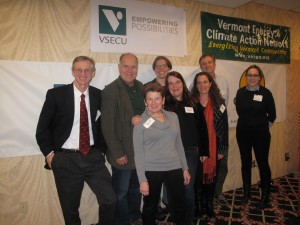 The Montpelier Energy Advisory Committee (MEAC) has implemented many ambitious projects in recent years, including spearheading the Net Zero Montpelier initiative to achieve net zero energy status for the whole city by 2030. MEAC has helped advance significant efficiency upgrades to the wastewater treatment plant and coordinated the development of 1 megawatt of solar energy to power municipal facilities, and was one of 50 cities nationwide to compete for the Georgetown University Energy Prize. This year MEAC distributed over 500 LED bulbs to Montpelier residents, organized an alternative transportation fair on the Statehouse lawn, and hosted a city wide “Towards Net Zero Home Tour” to showcase the benefits of efficiency, heat pumps, solar and modern wood heat in local homes. They also recently won city council approval to establish a Net Zero Revolving Loan Fund to help fund municipal energy efficiency projects.
The Montpelier Energy Advisory Committee (MEAC) has implemented many ambitious projects in recent years, including spearheading the Net Zero Montpelier initiative to achieve net zero energy status for the whole city by 2030. MEAC has helped advance significant efficiency upgrades to the wastewater treatment plant and coordinated the development of 1 megawatt of solar energy to power municipal facilities, and was one of 50 cities nationwide to compete for the Georgetown University Energy Prize. This year MEAC distributed over 500 LED bulbs to Montpelier residents, organized an alternative transportation fair on the Statehouse lawn, and hosted a city wide “Towards Net Zero Home Tour” to showcase the benefits of efficiency, heat pumps, solar and modern wood heat in local homes. They also recently won city council approval to establish a Net Zero Revolving Loan Fund to help fund municipal energy efficiency projects.
Best Project — South Burlington Landfill Solar Project 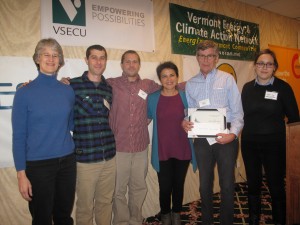 In 2012, the City of South Burlington and the South Burlington Energy Committee began exploring a solar project on the city’s closed landfill. Their work began with helping to push for needed changes to net metering to make this type of project eligible, and bore fruit recently when city officials, the energy committee and project partner, Encore Renewable Energy, announced the project is moving forward. The landfill array will generate about 2.7 MW annually on an otherwise unusable property in close proximity to its customers, including the city’s wastewater treatment facility. It will save local taxpayers about $5 million over the life of the project, generate thousands of dollars in property tax revenues, and the public/ private partnership requires no capital outlay from taxpayers. It is expected to break ground in early 2017.
In 2012, the City of South Burlington and the South Burlington Energy Committee began exploring a solar project on the city’s closed landfill. Their work began with helping to push for needed changes to net metering to make this type of project eligible, and bore fruit recently when city officials, the energy committee and project partner, Encore Renewable Energy, announced the project is moving forward. The landfill array will generate about 2.7 MW annually on an otherwise unusable property in close proximity to its customers, including the city’s wastewater treatment facility. It will save local taxpayers about $5 million over the life of the project, generate thousands of dollars in property tax revenues, and the public/ private partnership requires no capital outlay from taxpayers. It is expected to break ground in early 2017.
Local Action: The Key to 100% Renewable Energy The Samso, Denmark Success Story Soren Hermansen, the Director of the Samso Energy Academy, helped the island of Samso, Denmark transform its largely fossilfuel powered energy system into a 100 percent renewably powered society. The effort took over a decade to complete but Samso now enjoys a thriving economy and complete energy independence, having reduced their needs dramatically through efficiency and then harnessed wind, solar, bio-energy and more.
Supported by forward-looking, national “green” policies, Samso’s success is really a story of local leadership and community action. Samso residents helped lead the energy transformation, and many now benefit from ownership stakes in the renewable projects that power their lives. They are “doing well by doing good” and Soren Hermansen helped make it happen.
Soren has been recognized many times for his leadership, including being named a “Hero of the Environment” by Time magazine in 2008 and awarded the Gothenborg Award — the Nobel prize of the environment — in 2009. An Adjunct Professor in the Department of Development and Planning at Aalborg University, Soren also travels the world sharing Samso’s success story and helping other states and nations identify and chart the path for their own clean energy transformation.
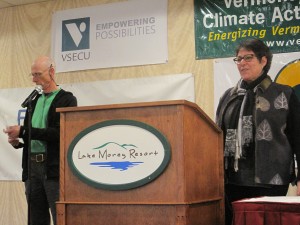 Finding Your Own Story Everyone has stories. Often story “prompts” can help us start to find our compelling narratives. Here are some prompts that might help trigger your thinking. Is there:
Finding Your Own Story Everyone has stories. Often story “prompts” can help us start to find our compelling narratives. Here are some prompts that might help trigger your thinking. Is there:
Successful Storytelling Understanding the elements of what makes a story compelling will help us connect with and inspire more people in this important work. While there are often many reasons for what makes a story great, there are also consistent characteristics. Great stories: